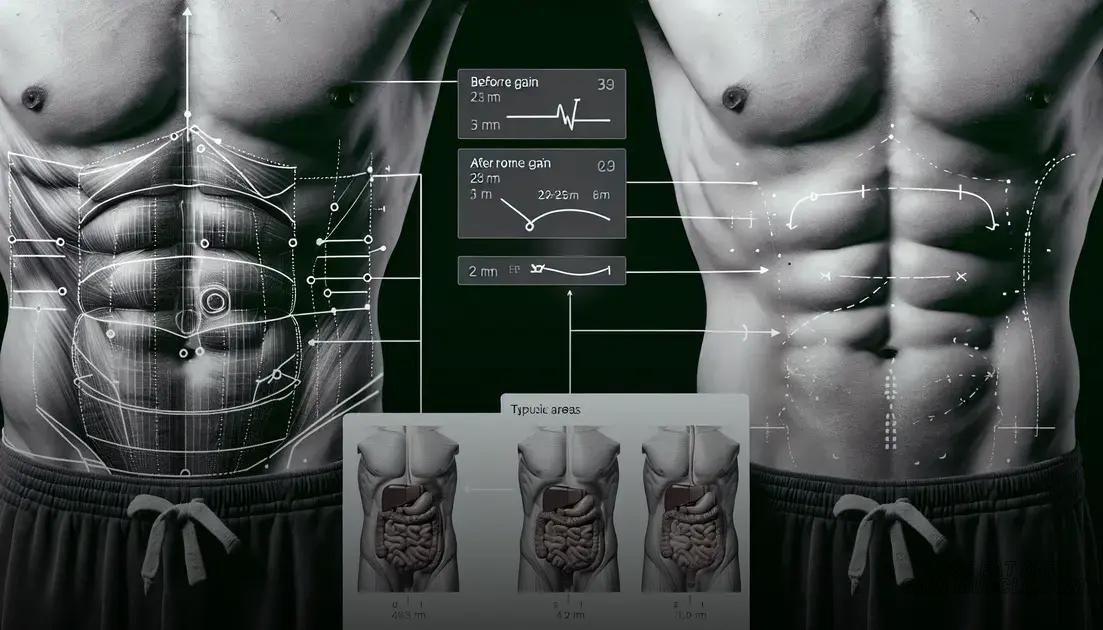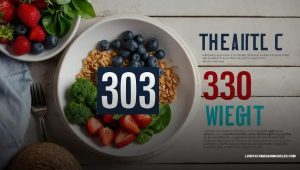Will I Lose My Abs If I Gain Weight? Here’s What You Need to Know
Gaining weight can obscure your abs due to increased body fat, but you can maintain your ab definition through a balanced diet, effective core workouts, and healthy lifestyle habits. Consistency in these areas is key to successfully keeping your core visible and strong.
Will I lose my abs if I gain weight? This question plagues many fitness enthusiasts worried about their core definition. Although gaining weight often leads to a decrease in visible abs, understanding the importance of diet and exercise can help you maintain your core strength. In this article, we will discuss how weight gain impacts your abs, the essential role of nutrition, and proven workout strategies to preserve your core muscles.
Understanding the Core Muscles
To understand the core muscles, we need to look beyond just the visible six-pack abs. The core is a group of muscles in the abdomen, lower back, and pelvis that support nearly every movement you make. These muscles include:
- Rectus Abdominis: Often referred to as the ‘abs’, this muscle runs vertically along the front of the abdomen and is responsible for flexing the spine.
- Transverse Abdominis: This is the deepest abdominal muscle. It wraps around the torso like a corset and plays a crucial role in stabilizing the spine and pelvis.
- External and Internal Obliques: Located on the sides of the abdomen, these muscles help with rotation and lateral bending.
- Erector Spinae: This group of muscles runs along your spine and helps to extend the back and maintain posture.
- Pelvic Floor Muscles: These muscles support the pelvic organs and play an essential role in core stability.
Strong core muscles are vital for overall body strength and stability. They help in maintaining good posture, reducing the risk of injuries, and improving athletic performance. When one part of the core is weak, it can affect the entire body alignment, leading to compensation from other muscles. Therefore, focusing on strengthening the core is crucial if you want to maintain those defined abs.
Impact of Weight Gain on Visible Abs

Gaining weight can significantly alter the appearance of your abs. This happens because as you add more body mass, fat can accumulate around the abdominal area, which obscures the definition of your muscles. The area where fat is stored is often referred to as your body fat percentage. When this percentage increases, the visibility of your abdominal muscles decreases.
The transverse abdominis works hard to maintain tightness in your core. However, if your body fat increases, it can cover this muscle, leading to a less toned appearance. Similarly, the rectus abdominis can lose its defined look if added fat layers obscure it. Most people strive for a visible six-pack, which typically requires a lower body fat percentage, often achieved through a balance of diet and exercise.
It’s also essential to understand that weight gain affects everyone differently. Factors such as genetics, diet, and overall lifestyle play significant roles in how your body stores fat. Some individuals may notice weight gain around the midsection more than others. This is why focusing solely on the number on the scale is not a holistic approach.
Ultimately, if you’re concerned about losing definition in your abs after gaining weight, it’s important to adopt a routine that includes a healthy diet and consistent exercise. Core workouts can help, but addressing overall body fat through cardio and strength training is just as crucial for preserving visible abs.
Diet’s Role in Maintaining Abs
Your diet plays a crucial role in maintaining visible abs. Even if you have strong core muscles, a poor diet can lead to fat accumulation that hides those muscles. To achieve and keep defined abs, focus on consuming a balanced diet rich in whole foods.
1. Prioritize Protein: Eating enough protein helps repair and build muscle. Foods like chicken, fish, beans, and nuts should be regular staples in your meals. Protein also helps you feel satisfied, reducing the chances of overeating.
2. Incorporate Healthy Fats: Not all fats are bad. Healthy fats found in avocados, olive oil, and nuts can help keep you full and are essential for overall health.
3. Choose Complex Carbs: Instead of refined carbohydrates like white bread and sugary snacks, choose complex carbs that provide lasting energy. These include whole grains, fruits, and vegetables. They keep your blood sugar stable and help manage cravings.
4. Stay Hydrated: Drinking enough water is essential for overall health and can help control hunger. Sometimes, our bodies confuse thirst with hunger. Aim for at least eight glasses of water each day.
5. Monitor Portions: Even healthy foods can contribute to weight gain if you eat them in large quantities. Pay attention to portion sizes to maintain a balanced caloric intake.
By focusing on a nutritious diet, you can support your workout efforts to keep your abs defined. Remember, consistency is key. What you eat today can influence how you look tomorrow.
Effective Workouts for Core Strength

To build strong core muscles, it’s important to include a variety of effective workouts in your routine. Here are some exercises that target multiple core muscle groups:
1. Plank: Start in a push-up position, but keep your elbows bent and forearms on the ground. Your body should form a straight line from your head to your heels. Hold this position for 30 seconds to a minute. This exercise engages your entire core.
2. Bicycle Crunches: Lie on your back with your hands behind your head. Lift your knees to a 90-degree angle and alternate bringing your opposite elbow toward your knee while straightening the other leg. This movement targets the obliques effectively.
3. Russian Twists: Sit on the ground with your knees bent and feet flat. Lean back slightly and hold a weight or just clasp your hands together. Twist your torso to one side, then the other. This exercise engages the oblique muscles and improves rotational strength.
4. Dead Bug: Lie on your back with your arms extended toward the ceiling and your knees bent at a 90-degree angle. Lower one arm and the opposite leg toward the floor. Return to the starting position and switch sides. This helps stabilize your core and improve coordination.
5. Mountain Climbers: Start in a plank position and bring one knee toward your chest, alternating legs quickly as if you are “climbing.” This full-body workout elevates your heart rate while strengthening your core.
6. Leg Raises: Lie on your back with your legs straight. Raise your legs to a vertical position and slowly lower them back down without touching the ground. This concentrates on the lower abs and helps build strength.
Incorporate these exercises into your weekly routine, aiming for at least three sessions per week. Consistency and proper form are essential to maximize benefits and avoid injuries.
Myths About Weight Gain and Abs
There are many myths about weight gain and abs that can mislead people. Understanding these myths is vital for a healthy approach to fitness and body image. Here are some common misconceptions:
1. You Can’t Gain Weight and Have Abs: Many believe that gaining weight automatically means losing your abs. While excess weight can hide your abs, gaining a few pounds doesn’t mean your muscle tone is gone. With the right diet and exercise, you can maintain a strong core.
2. Spot Reduction is Possible: Some think they can target fat loss in their abdominal area by doing endless crunches or sit-ups. Unfortunately, this is a myth. Fat loss occurs throughout the body as you decrease overall body fat through a combination of diet and exercise.
3. All Carbs are Bad: Many people avoid all carbohydrates when trying to get abs. However, not all carbs are created equal. Whole grains, fruits, and vegetables provide energy and are crucial for a balanced diet. It’s about choosing healthy carbs in moderation.
4. You Need to Do Cardio to Lose Weight: While cardio can help, it’s not the only way to lose weight. Strength training is just as important. Building muscle increases your resting metabolic rate, helping you burn more calories even when you’re not exercising.
5. Supplements Can Replace Diet: Some believe that taking supplements can give them abs without a good diet. However, supplements cannot replace a healthy diet and regular exercise. Whole foods provide essential nutrients that keep your body working well.
Being aware of these myths helps you focus on what truly matters: a balanced diet and a well-rounded fitness routine tailored to your body’s needs. Educating yourself allows you to take charge of your health positively.
Tips to Retain Ab Definition

To retain defined abs, focus on a combination of consistent exercise, a balanced diet, and healthy lifestyle choices. Here are some effective tips to keep your abs visible:
1. Maintain a Consistent Workout Routine: Regularly engage in exercises that target your core. Incorporate a mix of cardio for fat loss and strength training to build muscle. Aim for at least three core-focused workouts per week.
2. Monitor Your Diet: Keep your diet balanced and rich in nutrients. Consume lean proteins, whole grains, healthy fats, and plenty of fruits and vegetables. Avoid excessive sugar and processed foods that can contribute to fat gain.
3. Stay Hydrated: Drinking enough water is vital for overall health and helps control hunger. Aim for 8 to 10 glasses of water each day to support your body’s functions and enhance workouts.
4. Get Enough Sleep: Lack of sleep can cause hormonal imbalances that lead to weight gain. Aim for 7 to 9 hours of quality sleep each night to support recovery and fat loss.
5. Manage Stress: High stress levels can lead to unhealthy eating habits and weight gain. Incorporate stress-reducing activities, such as yoga, meditation, or regular physical activity, into your routine.
6. Track Your Progress: Keep a journal of your workouts and meals to stay accountable. Regularly assess your body fat percentage and adjust your diet and exercise as needed to keep your abs defined.
By following these tips, you can help maintain your ab definition while enjoying a healthy lifestyle. Remember, consistency and balance are essential in your fitness journey.
In summary, maintaining your abs while managing weight is achievable
By understanding the core muscles and the impact of weight gain on visible abs, you can take control of your fitness journey. The role of diet is crucial; nourishing your body with the right foods will support your efforts. Incorporate effective workouts that strengthen your core and dispel common myths to empower your knowledge on weight gain and abs.
Lastly, follow the tips provided to retain your ab definition, focusing on consistency and a balanced lifestyle. With dedication and the right strategies, you can enjoy both physical and mental well-being while maintaining that desired core strength.
FAQ – Frequently Asked Questions about Maintaining Abs and Weight Gain
Will I lose my abs if I gain weight?
Gaining weight can obscure your abs due to fat accumulation, but with the right diet and exercise, you can still maintain core strength.
What diet should I follow to keep my abs defined?
A balanced diet rich in lean proteins, whole grains, healthy fats, and plenty of fruits and vegetables will help you retain your ab definition.
Are there specific workouts for core strength?
Yes, effective workouts for core strength include planks, bicycle crunches, Russian twists, and dead bugs, among others.
Can I target fat loss in my abdominal area?
No, spot reduction is a myth. Fat loss occurs throughout the body as you decrease overall body fat through diet and exercise.
How can I track my progress in retaining ab definition?
Keep a journal of your workouts and meals, and regularly assess your body fat percentage to adjust your diet and exercise routine as needed.
What lifestyle changes can help maintain my abs?
Incorporating stress management techniques, staying hydrated, and getting enough sleep are crucial for maintaining overall health and ab definition.













